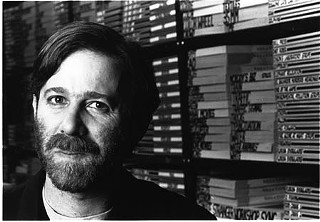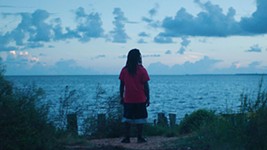Sorting the Family's Dirty Laundry
AFS Documentary Tour: 'Intimate Stranger'
By Anne S. Lewis, Fri., Nov. 6, 2009
Chances are when you think of filmmaker Alan Berliner (more on that below), you think of Nobody's Business (1996), the film he made about his cranky dad, the late Oscar Berliner, who famously permitted himself to be dragged kicking and screaming in front of the camera for a movie – sure to be a flop – about a nobody (himself) whom no one would give a flip about. (His words.) He would be wrong on both counts: Following its PBS broadcast on POV, the Emmy-winning film was a huge popular and critical success on the festival circuit and today frequently appears on film school syllabi.
(Those who think of Alain Berliner, the French director of Ma Vie en Rose fame, are referred to Our Own Berliner's fourth film, 2001's The Sweetest Sound, in which Berliner brought together all the Alan Berliners in the world that he could locate, including Alain, to compare notes on how they've lived their lives with the same name. It's confusing but not really. Berliner makes personal films: identity, family, memory, his sleep problems.)
Fans of Nobody's Business will perk up when they hear Oscar's instantly recognizable, perpetually chapped New Yawk-y voice (over), this time dissing his ex-father-in-law – the late Joseph Cassuto, Alan's maternal grandfather and the subject of his second film, Intimate Stranger (1991) – as a "nothing and a nobody," not to mention an un-filmworthy subject and a poseur. Here, Oscar is just one voice in a group of family members conducting an off-camera post-mortem about the enigmatic Cassuto. Was he ordinary or extraordinary in life as a father, husband, grandfather, friend, or business associate?
Cassuto, a Palestinian Jew living in Egypt, built a successful business there as a cotton buyer for the Japanese prior to the Second World War, but was forced to send his wife and two of their four children off to New York during the war. When the family diaspora ended and the culturally and geographically separated family reconstituted – albeit somewhat shakily – stateside, Cassuto was unable to regain the business stature and cachet he'd always enjoyed in Alexandria. His decision to resume his business in Tokyo for 11 months of the year while his wife raised their family in New York, not surprisingly, generated some significant, transgenerational reverberations.
Cassuto would later be killed by a car while crossing the street in New York. At the time of the accident, he was in the process of writing an autobiography. With amazing archival footage, old photos, and the punctuating clack and ring of a manual typewriter – signature Berliner devices all – his grandson takes a shot at completing the unfinished work. We eavesdrop on a family discussion that the filmmaker describes as walking "a fine line between sorting the dirty family laundry and polishing the precious family jewel."
Austin Chronicle: How does it feel, 18 years later, to look back at Intimate Stranger?
Alan Berliner: The one thing that always strikes me when I look back at it is that it was made on 16 millimeter motion-picture film. If ever there was a project that could have benefited from things like Photoshop, After Effects, and nonlinear editing systems, this was it. I shot it with a windup Bolex camera and edited it with painstaking diligence on a flatbed editing table. There are so many short shots and so many quick cuts of both sound and image that the work print and the soundtrack reels had become incredibly fragile objects by the time I was done – dense mosaics of film and splicing tape. Short of processing the film myself, or handwriting the titles and credits myself – I did hand-type them on an old manual typewriter, though – Intimate Stranger is the epitome of a handmade film.
I remember spending entire weekends under the hot lights of a copy stand, barely coming up for air or meals, using a macro lens to shoot inside tiny little postage stamps, framing individual words inside hundreds of letters, envelopes, documents, and newspaper pages, not to mention hundreds of actual photographs of varying dimensions – each one of which had to be composed and focused differently – and all scored to the soundtrack of a manual typewriter. It was incredibly labor-intensive, but also somehow intensely emotionally satisfying. This film will forever be for me the measure of how I define a labor of love.
AC: Can you talk a bit about how some of the signature Berliner flourishes that you introduced in Intimate Stranger have evolved or taken on a life of their own in subsequent films? Which have become regulars, and which, if any, have been discontinued or modified?
AB: The resonance of using the sounds of a manual typewriter as a unifying device – musically, thematically, and metaphorically – throughout Intimate Stranger was very powerful for me. It made me realize that every film subject could and should have its own unique cinematic language, and that if I was patient enough and open to the process of discovery, I might be able to intuit a unique storytelling approach to every film I make.
That insight led to the use of the metronome and the boxing footage in Nobody's Business and the use of computer iconography and the array of keyboard sounds in The Sweetest Sound, which I also intended as a playful reference to the old-fashioned sounds of the manual typewriter that I employed in Intimate Stranger. It seemed especially appropriate because the computer was so important to my search for all the other Alan Berliners in the world, not to mention my quest to find genealogical and historical information on my name. It doesn't take long to see that my last film, Wide Awake, borrows and includes bits and pieces of "flourishes" from all of my films – and then some.
AC: When you watch the film today, are there things you would have done differently?
AB: In retrospect, I find that some of the rhythms I generated with the sound of the manual typewriter now feel a bit too abrupt, a bit too fast for my taste. Maybe my metabolism has slowed down over the years? It's not that I would type any slower, just that I would hold some images a little bit longer. Remember that some images in the film are just two or three frames long! In general, I'd let parts of the film breathe out a little bit more so there's more time for contemplation and reflection. I also wish I had done more with my footage from contemporary Japan. I shot a tremendous amount of film there back in 1989 and 1990, when Japan was an economic powerhouse, and ended up using very little of it.
AC: One of the most memorable scenes in 2006's Wide Awake, about your lifelong sleep problem, was your caffeinated on-camera tour of your famous archive – your visual and auditory toolbox. Any new additions to report?
AB: A nice story: Two years ago, a woman in her mid-60s wrote to me after seeing Wide Awake, complaining that because she's unmarried with no children, that there's no one to leave all of her personal family photographs and documents to – at least no one who would cherish them or preserve them in any way. She was afraid they would just be thrown away and "end up in the Staten Island landfill" upon her death. Seeing my collection of "orphaned" photographs, photo albums, journals, passports, scrapbooks, slides, etc. in the film piqued her curiosity, and she decided to contact me.
I wrote back and invited her over to visit my studio. After seeing my archive and talking together for about an hour, she asked if she could put me in her will and leave all of her personal family photos and documents to me. In short, she'd rather have them sit quietly on the "orphan" shelves of my studio than risk them being lost forever. And just one hour before we were complete strangers! I also encouraged her to start her own Web page where she could not only post her treasure trove of images, but also explore her family history along the way. Now, two years later, she not only has her own website, but continues to keep a very active blog.
AFS Documentary Tour presents Intimate Stranger with filmmaker Alan Berliner in attendance on Wednesday, Nov. 11, 7pm, at the Alamo Drafthouse at the Ritz. Tickets are $4 for AFS members and $6 for the general public. For more info, see www.austinfilm.org.










